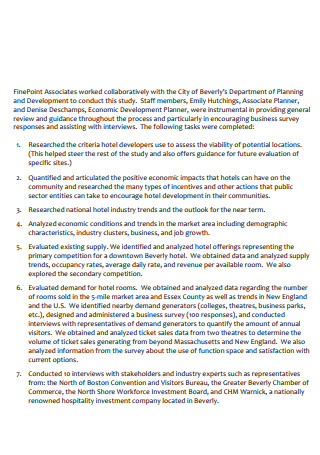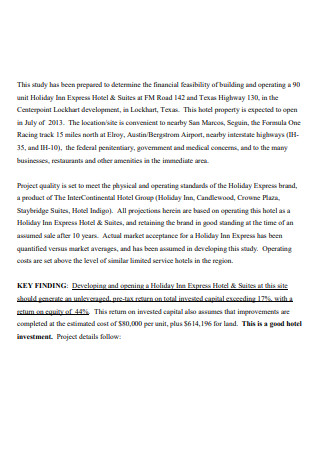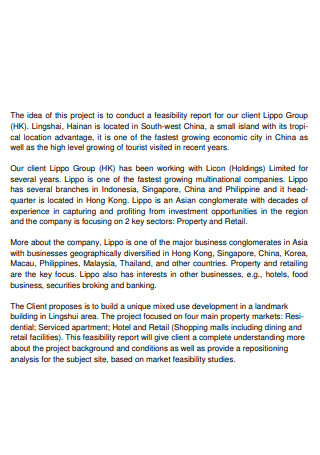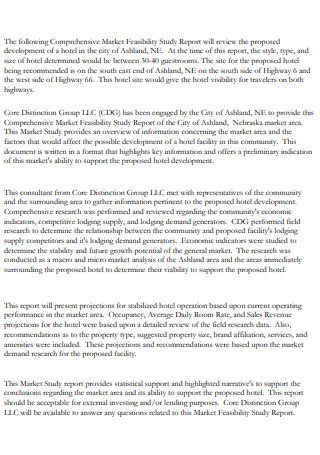3+ SAMPLE Hotel Feasibility Report
FREE Hotel Feasibility Report s to Download
3+ SAMPLE Hotel Feasibility Report
What Is the Purpose of a Hotel?
How are Hotels Classified?
How To Create A Hotel Feasibility Report
FAQs
Is the hotel feasibility report significant to the hotel business?
How can you check out the other local hotel competitors?
Is a motel the same just like a regular hotel?
What Is the Purpose of a Hotel?
First of all, a hotel is an establishment providing paid accommodation for a certain given period of time. Encyclopedia states that the primary purpose of hotels is to provide travelers with shelter, food, refreshment, and similar services and goods, offering on a commercial basis things that are customarily furnished within households but unavailable to people on a journey away from home. Facilities offered in a hotel may differ from the type or class of the hotel. Hotels are classified and categorized according to its size, geographic location, target customer market, services provided, available facilities, number of rooms, affiliations, ownership, et cetera. People usually used these classifications as their basis for selecting the hotel. Some of the hotel categories are: International luxury; Lifestyle resorts; Upscale full-service; boutique; economy; and motel.
An international luxury hotel is a hotel providing luxurious accommodations, full service and high quality amenities and facilities, with the highest standard of professional service provided. A lifestyle resort hotel appeals to the guests’, as the word mentioned, lifestyle. It provides activities and functional design, focusing more on spaces and in the guests’ overall experience. Upscale full-service hotels put utmost importance on brand recognition and the loyalty of their clients. They provide full-service, or all kinds of guest services. These include meetings and conference room facilities, gym and fitness center, spa facilities, business center, room service and restaurants, et cetera. Boutique hotels are smaller, usually stylish and more intimate hotels. The number of rooms is usually less than 100. Economy hotels, or sometimes known as budget hotels, provide just the basic and minimum amenities and are priced lower than the regular hotel. This type of hotel usually caters to the backpacker or budget-minded kind of traveler. A motel usually caters to road trip travelers or workers, having direct and easy access to the car parks.
How are Hotels Classified?
A hotel is, first and foremost, a business operation. It’s an income generating establishment catering to an identified group of clientele or customer providing lodging services at a given price based upon different categories. As a customer, you would always check out these categories where these hotels are grouped in. Your needs and wants when looking for an accommodation should be addressed by that particular hotel. Since there are a lot of different hotels out there to choose from, you’re looking for that hotel that ticks all the boxes on your checklist for a hotel stay. Now, hotels are grouped according to classification. Most travel websites have made it an easy experience for travelers to browse through and make their bookings on these hotels accordingly. These are some of the classification in which hotels are grouped.
How To Create A Hotel Feasibility Report
Now that you know the fundamentals of what a hotel is all about, the next question is, what do you do when you want to own and operate a hotel business? Before you make your hotel business plan, you first need to create your hotel feasibility report. A feasibility report, or sometimes known as a feasibility study, is your roadmap when creating or starting your business. It includes an analysis of the economic, legal, logistics, and technological considerations of the hotel’s business operations. It addresses the type of business you have and addresses future issues or potential concerns surrounding that type of business. Essentially, a hotel feasibility report looks into how workable, practicable, and sustainable the hotel business is. In your case, you want to break it down into several areas to specifically identify each area of concern to run a hotel business. Here are some of the steps in making an effective hotel feasibility report.
Make your Demographics Analysis
This is where you study the proposed location site for your hotel. Some of the considerations include the location being attractive, accessibility to your customers, and presence of competitors within the area. It also includes the neighborhood surrounding the area and the local economy. Is the local economy thriving in that area? There’s also the considerations such as the population, local income levels, employment, available transportation, and the environment.
Identifying your Organizational Structure and Human Resources
Identify who will be responsible for the running of the hotel. Identify the management position, the accounting, the human resources, the staff, even who will be running the facilities. Consider where you’re going to hire them and what will be their salary according to the local economy where your hotel is situated.
Create your Market Analysis
This is where you do your market study. Your focus market is your target customers. Identify who are your target customers and what kinds of services you will be offering. You need to get more data about who your target customers are and what they are specifically looking for in a hotel so that you can customize your hotel service according to their needs. Keep in mind that your customers are going to be the ones who will bring revenue to your hotel. You also need to identify the market size of the type of hotel you’re going to have. Meaning to say, who are the competitors within your area that are offering the same type of hotel service that you’re planning to have. Based off on this study, you can make your marketing strategy, creating service and offerings that would make you stand out from your competitors. Also, getting data from your competitors will give you a heads up on how well hotels with the kind of services you’ll be offering are doing or faring within the local economy.
Plan for your Products and Services
After you have structured your market analysis study, it’s time to plan for your products and services. This will be based on the type of hotel that you have in mind, whether you’re planning to go for a world class service hotel, the mid-range type, or the budget or economy type of hotel. Your services should cater to the specific needs of your target customer market. Also, your services could be the facilities you’re offering, like a fitness center, rooms for conferences and events, a swimming pool area, a recreation area, a hotel and bar restaurant. Once again, check your competitors. Create that type of product and service that makes you stand out.
Do the Financial Analysis
You can now start developing your financial analysis. Keeping your capital and budget in mind, you need to make estimations and projections of income and expenses. Examine your total property size, how much it’s going to cost you to build the facilities and amenities with the type of hotel you had in mind. Establish your hotel revenue sources. Consider your room cost, how much will you be charging per room per night, and can be also per person. Your source of revenue could also come from food and beverage and events such as conferences and meetings booked. Your basis or your benchmark should be the hotel industry with the local area. Study the cost range of the other hotels, or your competitors, within your area. Make sure that your cost is something that’s competitive, at the same time something that your target customers can also afford. Analyze your fixed expenses, which are your utilities, facilities and room maintenance, license permits, taxes, insurance, and human resources to name a few. How much does your overall operation costs on a day to day basis? At the end of the day, your financial analysis should come to a conclusion that your hotel operation can be operated and sustained for a long term basis.
FAQs
Is the hotel feasibility report significant to the hotel business?
Yes, it is. The purpose of the feasibility report is to determine if your business is profitable and sustainable. The report considers all the elements of the business such as the location, the size, the marketing strategy, the financial analysis, and the human resources.
How can you check out the other local hotel competitors?
Part of doing the feasibility report is considering your local hotel competitors. Gather data on the type of services they offered, the average number bookings that they have on a given time period, their hotel rates, their customer ratings and reviews, and how long they have been in the hotel business. You can search all of this information through the internet. Travel websites such as TripAdvisor usually have all the hotels classified and categorized accordingly so that you can easily search based on the type of service or accommodation you’re looking for in a hotel.
Is a motel the same just like a regular hotel?
The difference between a hotel and a motel is in their size and accessibility. Regular hotels usually have larger accommodations, more rooms. Luxury and comfort are the usual goals of a regular hotel. Motels are smaller in structure, have fewer rooms, and mostly cater to customers who are on the road most of the time, the reason why a motel is structured with direct accessibility to the parking lot.
Planning for a hotel business is no mean feat. There are a lot of considerations to take in, making, of course, your customers’ satisfaction your top priority. No matter what kind of hotel business you get into, big or small, and no matter how long or short your customers will be staying, your hotel should always provide comfort, convenience, relaxation and hospitality. The key to having a successful hotel business is having a good hotel feasibility report. On our website, there are lots of different feasibility report templates to choose from, but we also have specific ones made just for the hotel business. With the help of our templates, you can be able to structure your business easily. See how effective your business can be, and let our hotel feasibility report template help you out there. Download one now!




